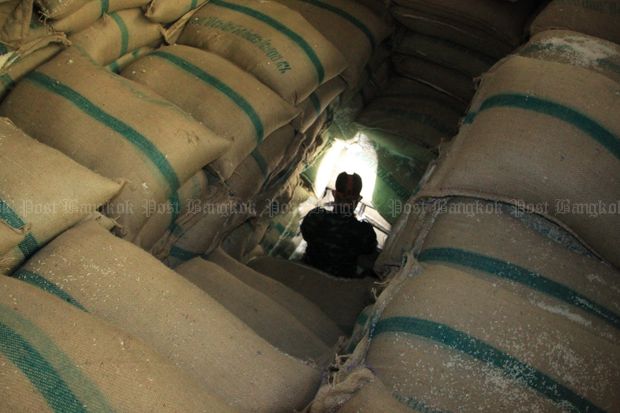
The Finance Ministry will by Sept 30 demand damages up to 510 billion baht incurred by the rice-pledging programme from ex-PM Yingluck Shinawatra and some of her cabinet ministers, as well as officials involved in the scheme.
The officials and ministers who will have to pay are those accused by the National Anti-Corruption Commission (NACC) — Ms Yingluck, former commerce minister Boonsong Teriyapirom, ex-deputy commerce minister Phoom Sarapol and Manas Soythong, former director general of the Foreign Trade Department.
Deputy Prime Minister Wissanu Krea-ngam said on Friday the two fact-finding committees — one each under the commerce and finance ministries — will finish their work by the end of this month.
Their reports will then be sent to the prime minister, who will have the Civil Liabilities Committee chaired by the comptroller general determine the damages for each of the accused persons and asked them to pay.
"At this stage, the accused may file counter lawsuits with the Administrative Court within 30 days to revoke the order.
"But if they don't, we'll seize their assets," he said.
Mr Wissanu said the procedure was not without precedent, citing two cases.
In 2005, former Bank of Thailand governor Rerngchai Marakanond was ordered to repay 186 billion baht the central bank had spent defending the reeling baht, which led to the flotation of the local currency and culminated in the 1997 financial crisis.
Mr Wissanu also cited another case where this method of reclamation was used — the procurement of fire trucks and boats by Bangkok Metropolitan Administration where the wife and children of the late ex-governor Samak Sundaravej were ordered to repay 587 million baht in damages in 2014 on his behalf.
The procedure is based on Section 12 of the 1996 tort liability law for government officials.
The rice-pledging programme was one of the 2011 election campaign pledges of Ms Yingluck's Pheu Thai party, which claimed it would help the majority of people and narrow the income gap.
Under the programme, the government bought all rice farmers could produce at much higher prices than market prices at the time and kept it in state warehouses across the country.
As the losses of the programme widened, the government tried to limit the damage by setting up a revolving fund and accelerating rice sales to pay farmers.
As world farm prices continued to plummet, criticism mounted. The opposition Democrat party also pointed to corruption at both the operational level and government-to-government rice sales by the Commerce Ministry.
The NACC later found the case had ground and accused Ms Yingluck of dereliction of duty because she had failed to stop the programme despite numerous warnings.
She was impeached in January this year by the National Legislative Assembly and banned from politics for five years.
The NACC accused Mr Boonsong and Mr Phoom of corruption in G-to-G rice sales. They too met the same fate in January.
